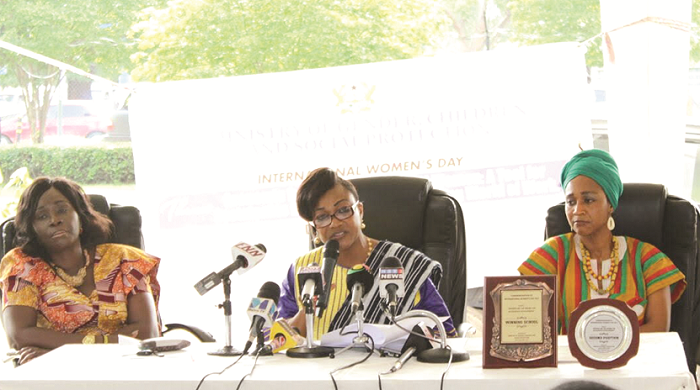
Ghana launches 2017 Int. Women’s Day
International Women’s Day (IWD) is annually observed on March 8 to celebrate women’s achievements throughout history and across nations. It is also known as the United Nations (UN) Day for Women’s Rights and International Peace.
The first IWD was celebrated on March 19 in 1911, to commemorate the day the Prussian king promised to introduce votes for women in 1848. The date was later moved to March 8 in 1913.
The messages given at these events often focus on various themes, such as innovation, the portrayal of women in the media or the importance of education and career opportunities.
This year, as usual, Ghana will join the international community to mark the event; and the Ministry of Gender, Children and Social Protection(MoGCSP) has launched this year’s celebration, with a call on women to embrace change.
Theme
The day, which falls on Wednesday, March 8, 2017, is on the theme: “Women in the changing world of work: Planet 50-50 by 2030,” at the global level.
Ghana has, however, adopted the theme: “Economic empowerment of rural women: A tool for sustainable development in a changing world of work,” and will mark the day at Prestea Huni-Valley in the Western Region.
At the launch, the Minister for Gender, Children and Social Protection, Ms Otiko Afisah Djaba, called on women from all walks of life to avail themselves to the various opportunities around them to help improve their economic circumstances.
Assisted by some female Members of Parliament (MPs), including Ms Freda Prempeh, Tano North; Ms Gifty Twum Ampofo, Abuakwa North; Ms Barbara Ayisi, Cape Coast North, and Nana Akua Afriyie, Ablekumah North, to launch the day, she said the theme was to demonstrate the ministry and the new government’s commitment to help rural women and girls to achieve their ambitions.
She noted that the theme was chosen to also challenge the negative traditional and socio-cultural practices, call for gender-balanced leadership, value every woman and man’s contribution equally and create inclusive and flexible cultures in line with the focus of the international community.
Policy makers
Ms Djaba called on policy makers and stakeholders to make the theme practical and real, saying although there had been considerable improvement in Ghana in its quest for gender equality and equity, there were still complex issues of male dominance and patriarchy that needed to be addressed to step up the country’s collective effort towards achieving “Planet 50-50 by 2030”.
Ms Djaba also urged all Ghanaians, particularly the media, to join the global campaign ‘Be Bold for Change; to enable all Ghanaians to be bold and challenge the discrimination and difficulties that confront the rural woman by changing the world of work for all women in Ghana.
She said the plight of the rural woman was characterised by socio-economic hardships, such as sitting in the sun, being beaten by rain and bitten by snakes and scorpions, compounded with poverty, the lack of formal education, insecure and unhealthy working environment, violence and abuse, lack of credit facilities and technological advancement to improve their businesses and economic empowerment for a better working world.
According to her, Prestea Huni-Valley was chosen to celebrate the day to highlight the menace of ‘galamsey’ and its implication for women and children, as well as the overall negative effects on the development of the people in the area and the environmental degradation.
Discrimination and abuse
Ms Djaba lamented that after 60 years of independence, women in Ghana still suffered various forms of abuses, adding that the ministry had developed a number of policies, including the National Gender Policy, the Child and Family Welfare Policy, the Justice for Children Policy and the Social Protection Policy, to address some of the issues confronting women in the country.
In their various submissions, the MPs present called on women in both the informal and formal sectors to aspire for greater laurels in all spheres of endeavour.
Some other activities earmarked to celebrate the IWD across the country aside from the grand durbar in the Western Region include radio and television talks, sensitisation talks in churches and mosques, panel discussions on radio and television, as well as a football match between the Black Queens and staff of the MoGCSP.
